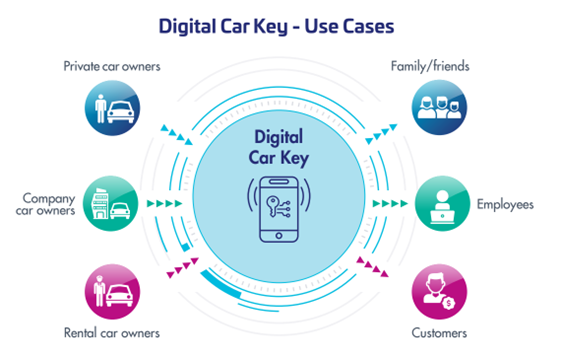What is a Digital Car Key?
A digital car key, put simply is a feature that can enable the end-user to unlock their car door through their smart device – replacing the need for a physical key or a fob.
What are the benefits of digital car keys?
Besides never having to worry about misplaced keys again (we’ve all been there), there are several other tangible benefits of digital car keys – including:
- Car owners can virtually share car keys with friends and family members. So for example, say a family member needed keys to the car, but it wasn’t possible to meet up in person to hand them over – a digital key ensures they can have access when needed.
- The need to check in at a car rentals desk is removed, as rental owners can digitally share keys with customers.
- Company car fleet owners can digitally share car keys with employees, giving access for a specific day or period of time.
In short, digital keys enable car owners to easily manage the use of their vehicles from a smart device, in a seamless way.

What are the trends driving the market?
The Automotive Digital Key Market is expected to increase by USD 640.39 million from 2021 to 2026, according to forecasts by market researchers Technavio. So, what’s driving this adoption forward?
According to the Technavio report, while the use of smartphones as a digital key is still in its early stages – there are examples of some manufacturers including this capability in wearable devices. An example of this in action is Jaguar Land Rover, and the introduction of the activity key wearable.
Another example is Apple CarKey, allowing iPhone or Apple Watch users to unlock cars wirelessly.
Another key trend in the market, as with any new technology entering the mainstream, is the need for standardizing technical standards and ensuring robust levels of security. This is the main driver behind groups such as the Car Connectivity Consortium.
The Car Connectivity Consortium
The goal of the Car Connectivity Consortium (CCC) is to develop a standardised ecosystem for global smartphone-to-vehicle connectivity solutions. The CCC represents a large portion of the global automotive and smartphone industries, with more than one hundred member companies; including BMW, Honda, Apple, Samsung and Thales.
The joint effort among all these members led to the CCC Digital Key Certification, providing a standardised solution to ensure interoperability and security of implementation. This should ensure a large adoption of the CCC Digital Key by all mobile device OEMs and car makers.
Thales has been a member of the CCC since 2017 and the early stage of the CCC Digital Key standardisation. We actively contribute to the development of the CCC Digital Key specification and certification program. Thanks to our chairman position in the CCC Digital Key Certification working group, our standardisation team has been leading the certification activities since 2019.
Establishing customer trust
Cars can be one of the most high value items an individual owns, meaning these digital keys require both trust and convenience. Mobile devices and vehicles must be able to connect with each other securely.
To ensure this, digital IDs and associated digital keys need to be provisioned and stored securely into each component of the ecosystem: in mobile devices on one side, and in vehicles on the other side. This way, both sides will be able to recognise each other through a secure and mutual digital authentication, based on encryption mechanisms and Ultra Wide Band (UWB) technology preventing relay attack.
How Thales is securing digital automotive keys
Thales provides a secure, end-to-end solution for automotive stakeholders looking to implement the latest CCC Digital Key specification.
We provide our connectivity and cybersecurity expertise from car drivers´ enrolment into Digital Key service platforms, the provisioning and storage of digital IDs and associated keys, up to credentials renewal and key revocation.
For further reading check out:



